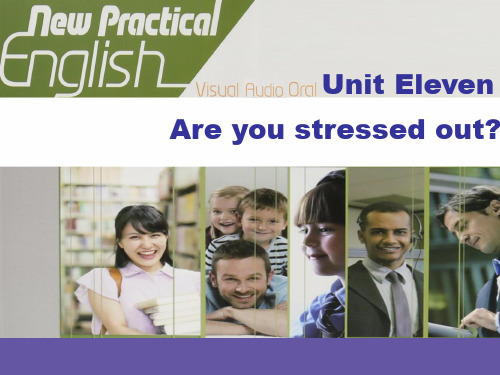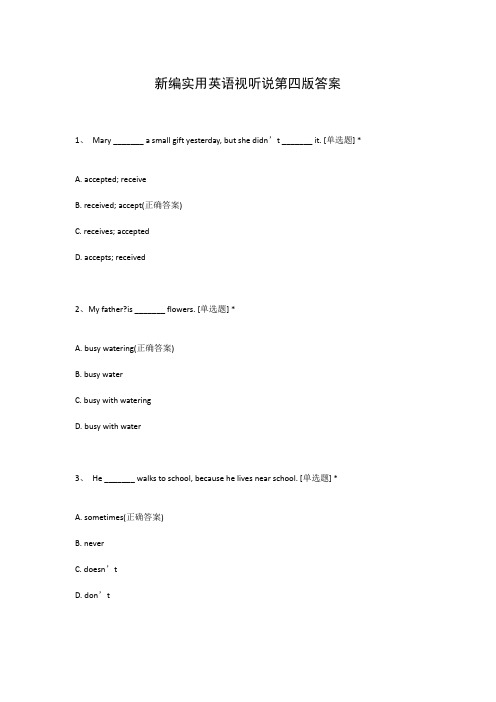编实用英语视听说
新编实用英语(第四版)视听说基础教程How do we get to the Elks Club

2. A: __W__h_e_r_e_is___the new Italian restaurant? B: It’s__o_n_t_h_e__co__rn_e_r_of Kent Street and Oxford Street. A: Are you sure? B: Yes, it’s_n_e_x_t_to the post office.
2. Where is the Elks Club? a. On Maple Street. b. On Third Avenue. c. Next to the post office.
3. What does the woman want from Tracy? a. Her autograph. b. Her photograph. c. Directions.
Student A: Where’s … Student B: It’s on / on the corner of … Student A: How do I get there? Student B: Walk / Go / Turn … It’s next to /
across the street from …
Road. Go straight for two blocks and it’s next to the movie theater.
4 SUM-UP
Words and expressions
autograph n. 亲笔签名 block n. 街区;大厦
corner n. 角落 Italian a. 意大利的
新编实用英语(第四版)视听说基础教程This gray tie is nice

They’re in the _g_r_e_e_n_ _f_o_ld_e_r_ .
Task 3 b. Watch from 00:25 to 01:11 again and fill in the missing words.
Task 6 Watch from 01:48 to 02:08. What’s in the boxes? Check the correct items.
Task 7
Watch from 02:08 to the end of the episode. What do Len and Tracy think about the ties? Complete the bubbles with the words in the box.
1. What’s in the folder?
2. What’s is in the Pictures Len is holding?
Suggested answers
1. Pictures. 2. Purses, sunglasses, umbrellas and bags. 3. The models and the clothes for the fashion show.
H
E
10
S
Key: 2. GLASSES 3. UMBRELLA 6. PURSE 7. BAG 10. SUNGLASSES
2 3 6 7
10
Look and predict
Look at these pictures from the episode. Len and Tracy are talking about a fashion show on Channel TV. Guess the answers to the following questions.
新编实用英语(第四版)视听说初级教程(下)U10-下

7. They were going to the beach. They put on their bathing suits. (clothes for running / clothes for swimming)
3. What happened to the person?
Jessica: ____fe_ll_o_f_f_a_c_a_m__e_l;_e_v_e_r_y_o_n_e_la_u_g_h__e_d_a_t_h_e_r_______________________________
Paulo: _lo_s_t_b_a_t_h_in_g__s_u_it_in__w_a_t_e_r;_h_a_d__to__g_o_n_a_k_e_d__to__p_o_lic_e__s_ta_t_io_n__b_e_c_a_u_s_e_s_o_m_e_o_n_e__h_a_d__
Unit |TOene
Visual Audio Oral
B. WRITE ABOUT IT. Use your answers from above to answer the questions below. 1. Who do you think had a better vacation? Why? 2. Do you think Jessica enjoyed her vacation? How do you know? 3. Do you think Paulo enjoyed his experience? Explain. 4. How did Jim feel about Jessica's story? 5. Describe the kind of vacation that you like. Why?
新时代实用英语视听说教程3

新时代实用英语视听说教程3New Practical English Audiovisual Speaking Course 3 in the New EraIntroduction:In the new era, as the world becomes more interconnected, the importance of English language skills has significantly increased. In response to this demand, the New Practical English Audiovisual Speaking Course 3 has been developed. This course aims to provide learners with comprehensive training in English listening, speaking, and pronunciation skills. It is designed to enhance the learners' communication abilities and empower them to navigate various real-life situations confidently. This article will discuss the key features and teaching methods employed in the New Practical English Audiovisual Speaking Course 3.Course Overview:The New Practical English Audiovisual Speaking Course 3 covers a wide range of topics that are relevant to learners in the modern world. It focuses on practical usage of the English language that is applicable in everyday life and professional settings. The course is divided into several modules, each addressing specific aspects of listening, speaking, and pronunciation skills.Module 1: Improving Listening SkillsThe first module of the course is dedicated to enhancing listening skills. Learners are exposed to a variety of audiovisual materials, including dialogues, interviews, and presentations. They are encouraged to activelylisten and comprehend the content while paying attention to pronunciation, intonation, and vocabulary usage. Through extensive practice, learners develop their ability to understand authentic English conversations and extract essential information accurately.Module 2: Developing Speaking SkillsThe second module focuses on developing speaking skills. Learners engage in interactive activities, such as role-plays, discussions, and presentations, to enhance their fluency and accuracy in spoken English. Emphasis is placed on developing clear articulation, appropriate use of expressions, and effective communication strategies. Through constant practice and feedback from instructors, learners gain confidence in expressing themselves in various situations, both formal and informal.Module 3: Mastering PronunciationThe third module is designed specifically to help learners master English pronunciation. Through the use of audiovisual materials and pronunciation exercises, learners are exposed to different phonetic sounds and patterns. They learn to differentiate between similar sounds, stress syllables correctly, and improve overall pronunciation clarity. Pronunciation drills and individual feedback enable learners to overcome specific challenges and develop a near-native accent.Teaching Methodology:The teaching methodology employed in the New Practical English Audiovisual Speaking Course 3 is learner-centered and communicative. It emphasizes active participation, interaction, and practical application oflanguage skills. The course incorporates a variety of teaching strategies, such as group discussions, pair work, and multimedia presentations, to engage learners and facilitate their language acquisition.Instructors, who are highly qualified and experienced in teaching English as a second language, create a supportive and inclusive learning environment. They provide personalized guidance and constructive feedback to help learners improve their skills effectively. Additionally, technology is integrated into the course, enabling learners to access online resources, practice listening exercises, and receive instant feedback on their pronunciation.Conclusion:The New Practical English Audiovisual Speaking Course 3 is a comprehensive and effective program for learners seeking to enhance their English language skills. Through its modules on improving listening skills, developing speaking skills, and mastering pronunciation, learners are equipped with the necessary tools to communicate confidently in various real-life contexts. The learner-centered approach, coupled with the expertise of instructors and incorporation of technology, ensures that learners not only acquire language skills but also develop a deep understanding of the English language. With the New Practical English Audiovisual Speaking Course 3, learners can embark on a successful journey towards becoming proficient English speakers in the new era.。
新编实用英语(第四版)视听说基础教程What did John Logie Baird invent

Task 3 Watch from 00:40 to 02:01 and answer the following questions.
1. When did Baird invent the television? a. In 1926. b. In 1928. c. In 1936. 2. What is Hoover’s first name? a. Willis. b. Walter. c. William. 3. Mary is sure about her answers to questions a. 1 and 2. b. 1 and 3. c. 2 and 3.
Task 4 Watch from 02:01 to the end of the episode and decide if the following statements are True or False.
1. They never have money prizes on Quiz time.
CONTENTS
WARM-UP
NOW WATCH FOLLOW-UP SUM-UP
1 WARM-UP
The words you need
Look at the pictures, read the speech bubbles and guess the meaning of the words in bold.
1. What is the woman’s name? __M__a_ry_.__________________________________ 2. When did she last appear on Len’s quiz show? __F_o_u_r_m__o_n_t_h_s_a_g_o_.________________________ 3. How much did she win? __$_2_0_0_.__________________________________
新编实用英语(第四版)视听说初级教程(下)U11-下

B. FOCUS ON BODY LANGUAGE. Choose one person in the scene. Watch the video again and check ( ✓ ) the things this person does.
NAME: _________________________________________
UUnnitit |EOlenven
Visual Audio Oral
A. PREDICT. Study the picture and check ( ✓ ) your predictions. Then watch the video to check your predictions.
1. I think Jack looks
take a personal time out take it easy tense try to ignore it
Grammar Point:
When Clauses Examples: When I feel tired, I take a nap. I drink tea when I feel sick. Take a walk when you are stressed out. When you have a backache, get a massage.
Visual Audio Oral
Unit Eleven Are you stressed out?
Unit | One
Stress
Visual Audio Oral
What You Should Learn to Do 1. Ask questions about what people
新编实用英语视听说第四版答案

新编实用英语视听说第四版答案1、Mary _______ a small gift yesterday, but she didn’t _______ it. [单选题] *A. accepted; receiveB. received; accept(正确答案)C. receives; acceptedD. accepts; received2、My father?is _______ flowers. [单选题] *A. busy watering(正确答案)B. busy waterC. busy with wateringD. busy with water3、He _______ walks to school, because he lives near school. [单选题] *A. sometimes(正确答案)B. neverC. doesn’tD. don’t4、The storybook is very ______. I’m very ______ in reading it. ()[单选题] *A. interesting; interested(正确答案)B. interested; interestingC. interested; interestedD. interesting; interesting5、74.No person ()carry a mobile phone into the examination room during the national college Entrance Examinations.[单选题] *A.shall(正确答案)B.mustC.canD.need6、—It’s too noisy outside. I can’t fall asleep.—I can’t, either. We have to ______ new ways to solve the problem.()[单选题] *A. come up with(正确答案)B. get on withC. make up withD. catch up with7、I saw the boy _______?the classroom. [单选题] *A. enter intoB. enter(正确答案)C. to enter intoD. to enter8、I’d like to know the _______ of the club. [单选题] *A. schedule(正确答案)B. schoolC. menuD. subject9、Mum is ill. I have to _______ her at home. [单选题] *A. look after(正确答案)B. look forC. look outD. look forward to10、53.On your way home, you can buy some fruit, meat, vegetables and ________. [单选题] * A.something else(正确答案)B.else somethingC.everything elseD.else everything11、Before leaving the village, he visited the old house _____ he spent his childhood. [单选题] *A in which(正确答案)B. whichC. to whichD at which12、1.I saw ________ action film with my friend yesterday, and ________ film was amazing. [单选题] *A.a...aB.a...theC.an...the(正确答案)D.an...a13、44.—Hi, Lucy. You ________ very beautiful in the new dress today.—Thank you very much. [单选题] *A.look(正确答案)B.watchC.look atD.see14、( )Keep quiet, please. It’s ________ noisy here. [单选题] *A. many tooB. too manyC. too muchD. much too(正确答案)15、Alice is a ______ girl. She always smiles and says hello to others.()[单选题] *A. shyB. strictC. healthyD. friendly(正确答案)16、He always ______ the teacher carefully in class. [单选题] *A. listensB. listens to(正确答案)C. hearsD. hears of17、You have failed two tests. You’d better start working harder, ____ you won’t pass the course. [单选题] *A. andB. soC. butD. or(正确答案)18、--Do you have a _______?--Yes, I _______ at a clothes store. [单选题] *A. work; workB. work; jobC. job; jobD. job; work(正确答案)19、Allen is looking forward to _______ his American partner at the trade fair. [单选题] *A. meetB. meeting(正确答案)C. be meetingD. having meeting20、There are about eight ______ students in my school.()[单选题] *A. hundred(正确答案)B. hundredsC. hundred ofD. hundreds of21、I am worried about my brother. I am not sure _____ he has arrived at the school or not. [单选题] *A. whether(正确答案)B. whatC. whenD. how22、Your homework must_______ tomorrow. [单选题] *A. hand inB. is handed inC. hands inD. be handed in(正确答案)23、It’s raining heavily outside. Don’t leave _______ it stops. [单选题] *A. whileB. sinceC. until(正确答案)D. when24、The yellow bag _______ me. [单选题] *A. belong toB. belongs to(正确答案)C. belongD. belongs25、41.—________ do you take?—Small, please. [单选题] *A.What size(正确答案)B.What colourC.How manyD.How much26、Boys and girls, _______ up your hands if you want to take part in the summer camp(夏令营).[单选题] *A. puttingB. to putC. put(正确答案)D. puts27、—Would you like some milk?—Yes, just _____, please. [单选题] *A. a little(正确答案)B. littleC. a fewD. few28、John Smith is _______ of the three young men. [单选题] *A. strongB. strongerC. the strongerD. the strongest(正确答案)29、He used to get up at six in the morning,()? [单选题] *A. used heB. did heC. didnt he (正确答案)D. should he30、What about _______ there by bike? [单选题] *A. goesB. wentC. goD. going(正确答案)。
新编实用英语(第四版)视听说基础教程Why did you go there

Look and predict
Look at this picture from the episode. The man in the picture went camping and during the night something strange happened to him. Guess the answer to the following question.
Focal point
why引导的疑问句
在回答由 why 引导的疑问句时,通常要求对事件的原 因进行解释说明,回答时可以以连词 because 开头,引出 原因, 也可以直接回答。在解释原因时,需要注意事情发生的时 间,对时态进行合理使用。 如果是对过去发生事件的解释说明,可以用一般过去时态, 如:“Why are you late today?”。回答针对昨天发生的 状况,可以是“because I played too late last night.”。 如果是对现在的状况进行说明,则可以用现在时态。如: — Why do you like playing football? 你为什么喜欢踢足球? — I think it is a very interesting game. 我认为它是一项非常有趣的活动。
2. A: Why did you close the window? B: _B_e_c_a_u_se_ I’m cold. A: I can’t _b_e_l_ie_v_e_i_t__ ! It’s a hot day and you are cold. Are you sick? B: No, I’m not __a_n_d__ it’s not a hot day. It’s cold.
Notes
- 1、下载文档前请自行甄别文档内容的完整性,平台不提供额外的编辑、内容补充、找答案等附加服务。
- 2、"仅部分预览"的文档,不可在线预览部分如存在完整性等问题,可反馈申请退款(可完整预览的文档不适用该条件!)。
- 3、如文档侵犯您的权益,请联系客服反馈,我们会尽快为您处理(人工客服工作时间:9:00-18:30)。
If he were here now, we could turn to him for help.
整理ppt
12
七、现在完成时
1.现在完成时的构成:助动词have (has) + 动词的过去分词 注:has 用于第三人称单数,have 用于其他所有人称。
• 如: What did Jim do yesterday? • ⑵疑问词当主语时:疑问词+动词过去式 • 如:Who went to home yesterday?
整理ppt
10
二、一般过去时的用法
1)在确定的过去时间里所发生的动作或存在的状态。 时间状语有:yesterday, last week, an hour ago, the other day, in
Championship in 2002hosted by
• Korea and Japan
• China first roared into World Cup
• Brazil won the 5th World Cup, by beating Germany, and mainly contributed to
整理ppt
4
athletic contests
• 冠军赛 • 锦标赛 • 奥林匹克运动会 • 世界杯 • 四分之一决赛 • 半决赛 • 决赛
• 阿尔加夫杯
• 斯诺克巡回赛
• championship • tournament • The Olympic Games • World Cup • quarterfinal • semifinal • Final • Algarve Cup • Snooker Tour Event
• In 2002, the South Korean team made …
• It was there that the team lost.
• However, in the end, South Korea finished fourth in the 2002 World Cup Tournament.
1982等。 Where did you go just now? I saw Tom in the street yesterday. I bought this TV set in Beijing last year.
2)表示在过去一段时间内,经常性或习惯性的动作。 When I was a child, I often played football in the street. He always went to work by bus. He used to act like that.
整理ppt
11
3)用过去时表示现在,表示语气委婉礼貌。 (1)动词want, hope, wonder, think, intend 等。例如:
Did you want anything else?
I wanted to ask you about that.
Did you want to speak to me now?
整理ppt
8
• 句中没有be动词的一般过去时的句子 • 否定句:didn’t +动词原形,如:Jim
didn’t go home yesterday. • 一般疑问句:在句首加did,句子中的动
词过去式变回原形。
• 如:Did Jim go home yesterday?
整理ppt
9
• 特殊疑问句:⑴疑问词+did+主语+动词原 形
整理ppt
6
Change the Sentences into the Past Tense
• I am a student. • He is a mechanic. • They are good friends. • We play football every day. • I don’t understand you. • He doesn’t like coffee. • What do you mean? • What does she give you?
Activities to do on a Rainy Day
整理ppt
1
• What were Davey, Ernie and Maureen doing on a rainy day? How do you think of it?
整理ppt
2
• the 17th FIFA World Cup Soccer
I wondered if you could help me.
(2)情态动词 could, would,例如:
Could you lend me your bike? 4)用在条件句中表示与现在或将来事实不符的虚拟语气。
If I were a bird, I would fly to Beijing.
整理ppt
5
Simple Past &. Present Perfect
• Since 1970, it has sponsored ….
• Of these nations, Brazil, with five …, has won the most times.
• In nearly eight decades of the …, only seven countries have won.
整理ppt
7
• Be动词在一般过去时中的变化:
• ⑴am 和is在一般过去时中变为was。 (was not=wasn’t)
• ⑵are在一般过去时中变为were。(were not=weren’t)
• ⑶带有was或were的句子,其否定、疑问 的变化和is, am, are一样,即否定句在was 或were后加not,一般疑问句把was或 were调到句首。
Ronaldo
• Turkey won the 3rd place
• South Korea first advanced to the World Cup quarter finals . events
• Rugby World Cup • IOC Olympic Games • FIFA World Cup
